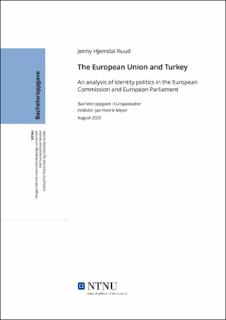| dc.contributor.advisor | Meyer, Jan Henrik | |
| dc.contributor.author | Ruud, Jenny Hjemdal | |
| dc.date.accessioned | 2021-09-13T16:05:46Z | |
| dc.date.available | 2021-09-13T16:05:46Z | |
| dc.date.issued | 2020 | |
| dc.identifier | no.ntnu:inspera:57494640:20970598 | |
| dc.identifier.uri | https://hdl.handle.net/11250/2775634 | |
| dc.description.abstract | Denne oppgaven tar for seg den avsluttende perioden i forholdet mellom EU og Tyrkia, ved å analysere Europakommisjonens 2016 Turkia-rapport, og den påfølgende plenumsdebatten i Europaparlamentet som fant sted 22. november 2016. Disse spesifikke hendelsene er valgt fordi det tok sted et militærkupp i Tyrkia i juli 2016, som førte til at politikerne i EP for første gang ba om at medlemsskapsforhandlingene skulle avsluttes. Det er en kvalitativ analyse av de to seksjonene, med konstruktivistisk teori som rammeverk. Debattanalysen tar for seg diverse diskurser fremført av politikerne i EP, og har som mål å finne spor av identitetspolitikk i det de sier for å begrunne at forhandlingene må avsluttes. Oppgaven konkluderer med at de avgjørende argumentene i debatten handler om manglende demokrati i Tyrkia, og at det derfor ikke er mulig å gi identitetspolitikk alene skylden for at forholdet tok slutt. | |
| dc.description.abstract | This essay aims to find identity politics in the way the European Commission and Parliament talk about Turkey during the final phase of accession negotiations. It studies two events in the relationship between the EU and Turkey; namely the EC’s Turkey 2016 report and a plenary debate in the EP on 22nd November 2016. These events have been chosen because of the military coup in Turkey that took place in July 2016, and because this debate was the first debate where MEPs called for suspending the membership negotiations. It is a qualitative analysis of the two parts, with constructivist theory as a framework. I use discourses made by MEPs to investigate whether it is identity politics or not that makes them reject Turkey. The essay concludes that the defining arguments in the debate are based on democratic criteria, and so therefore it is not possible to blame identity politics alone for the turn of the relationship. | |
| dc.language | | |
| dc.publisher | NTNU | |
| dc.title | The European Union and Turkey: An analysis of identity politics in the European Commission and European Parliament | |
| dc.type | Bachelor thesis | |
